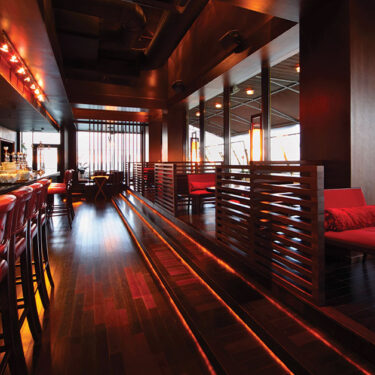Caesars Palace, MGM Resorts and several other Las Vegas hotel-casinos are slated to resume operations starting June 4, according to the Nevada governor’s May 26 press release. Though Las Vegas casinos must implement requirements such as mandatory temperature checks for guests and are subject to various restrictions, reopening is a significant milestone in the embattled hospitality sector’s recovery from coronavirus-related shutdowns.
At the same time, restaurants in many states are resuming outdoor dining or dine-in services.
Hand-sanitizing stations, plexiglass separators, reduced seating at table games, and contactless food service options are among the changes casino guests may notice when they return. While hotel swimming pools and restaurants are permitted to reopen in Las Vegas, the city’s day clubs and nightclubs must remain closed until further notice.
Reopening safely is top of mind for hospitality businesses as they work to adapt to new regulations, mitigate their potential liability risks, and remain competitive despite reduced capacity allowances.
“In part, businesses will be learning what constitutes best practices for reopening successfully through trial and error,” said Marc Adler, Managing Director, Burns & Wilcox Brokerage, Scottsdale, Arizona. “The most challenging aspect of that is the stakes are so high—the consequence of a misstep could be a resurgence in the number of COVID-19 cases.”
Hospitality industry among hardest hit by coronavirus
The hospitality industry virtually ground to a halt amid coronavirus-related lockdowns, with nearly half of all U.S. leisure and hospitality jobs lost in April. In Nevada, where casinos closed on March 18, 27.9 percent of the state’s workforce filed for unemployment benefits by mid-May.
Some casinos lost up to $14.4 million per day during closures, and the American Gaming Association estimated $4.7 billion in economic losses for each month the Nevada tourism industry was shut down. In Canada, more than 250,000 hospitality sector employees were laid off during shutdowns.
“So many industries and businesses are impacted when a casino shuts down,” said Bonnie Steen, Vice President, Associate Managing Director, Burns & Wilcox, New Orleans, Louisiana. “Food and alcohol suppliers lose their primary income stream, as do entertainers, lighting and sound crews, and many more—that one closure has a snowball effect.”
Phased economic reopening and the public’s wait-and-see approach could mean longer recovery timelines for the hospitality industry. Hotels and casinos will need to attract guests at a time when not everyone is ready to travel and venture out for recreational purposes. While the strong crowds that amassed when casinos reopened in Arkansas and Connecticut were encouraging, large conferences and conventions may be on hold for an extended period.
“The hospitality industry is dealing with utter unpredictability when it comes to the timing and degree of recovery,” Adler said. “Restaurants were hit incredibly hard by COVID-19 closures, but many were able to remain operational to some extent by offering takeout. Casinos were one hundred percent shut down, with zero revenue.” He explained that while casinos can resume operations relatively quickly, the public’s interest in returning to gambling or other activities involving large, concentrated gatherings is unknown.
Planning and risk management key to navigating uncertainty
While hospitality businesses’ risks, regulations and requirements evolve as they operate in a post-shutdown environment, effective risk management and careful planning will help them safeguard their operations amid the uncertainty.
A Hospitality Insurance policy that can help offset the expenses associated with “everyday” business risks like fires, slip-and-fall accidents and reputational harm is a critical investment during uncertain times. Additionally, businesses should mitigate their liability risks with Commercial Property Insurance, Directors & Officers (D&O) Insurance and Employment Practices Liability Insurance (EPLI).
The appropriate Restaurant Contamination Insurance coverage can determine whether a business survives an incident involving foodborne illnesses, which affect roughly 48 million Americans and 4 million Canadians annually. In April, the U.S. Department of Justice announced that Chipotle Mexican Grill would pay $25 million to resolve charges related to foodborne illness outbreaks that took place between 2015 and 2018 and sickened more than 1,100 customers.
“A small mom-and-pop or midsize business could be decimated by a single foodborne illness-related lawsuit,” Adler said, adding that the coverage provided by Restaurant Contamination Insurance policies helps with the expenses involved in rehabilitating a business’ reputation in the wake of an incident.
“It is one thing to physically clean your location, but then you have to convince customers that it is safe to return. For any business serving food, coverage for foodborne illnesses is a must-have.”

If a business is using outside vendors, such as a special janitorial company to sanitize the floors every night, that business owner should make sure that any potential risks are addressed in the vendor’s coverage. They should also ensure that the business is listed as an additional insured in the vendor’s policy.
An often-overlooked consideration for the hospitality industry is potential risk from a pollution or contamination incident, which can be very expensive to resolve. “Having an Environmental Insurance policy in place will help to offset costs a business could incur from having to remediate a mold issue, for example,” Adler said.
It is now more important than ever before that businesses protect themselves by making sure they have adequate coverage in place, emphasized Tyson Peel, Vice President and Director, Property & Casualty, Burns & Wilcox, Toronto, Ontario. “There are just too many potential losses that could put someone out of business right now — it only takes one incident and they happen every day.”
In light of COVID-19 restrictions, businesses have been changing their operations to function in a physically-distanced society. Many restaurants launched delivery services for the first time, including liquor delivery. Any change to business operations should be reviewed with your insurance broker or agent, Adler said. “You should consult your expert advisor to evaluate your coverage needs, whether you are just revising your revenue projection or completely changing the nature of your operation.”
Bringing in new vendors to sanitize premises introduces new risks, Steen added. “If a business is using outside vendors, such as a special janitorial company to sanitize the floors every night, that business owner should make sure that any potential risks are addressed in the vendor’s coverage. They should also ensure that the business is listed as an additional insured in the vendor’s policy.”
Smaller businesses without a risk manager on staff should fully avail themselves of their insurance broker or agent’s expertise. “Engage in an open, ongoing dialogue with your broker or agent,” Adler said. “They need to fully understand your business and your concerns in order to best determine how to help you protect your assets.”
At a time when many hospitality business owners are seeking guidance, industry experience counts, Peel pointed out. “Make sure you are talking to a knowledgeable expert,” he said. “Your policy may need to be amended due to the circumstances. It is always best to inform your insurer of any changes to your operations as they could potentially affect coverage if you have a claim.”
Focus on strict adherence to guidelines, documentation
As hospitality businesses reopen across the U.S. and Canada, the “main priority for businesses will be the health and safety of their staff and patrons,” said Peel.
Documentation and careful adherence to governmental guidelines are critical, according to Steen. Hotels and casinos should ensure they are following current Centers for Disease Control and Prevention (CDC) recommendations and complying with any other relevant laws and requirements. Additionally, Steen asserted, “everything should be very well documented.”
If regulations dictate that casino chips must be cleaned within certain time increments, for example, a log should be kept to document that work. In the event an incident occurs or the casino’s practices are called into question, this documentation serves as an invaluable record of the steps taken to protect guests and comply with regulations.
For most hospitality establishments, the additional safety measures put in place to reduce the transmission of COVID-19 add a layer of responsibility to what are already stringent risk management protocols, Adler said.
Ultimately, though, the greatest challenge ahead may be the unknown. “It is a new world. Restaurants are opening under very tight parameters and limitations, and the entertainment industry is not yet having concerts or live shows. It is going to take time to get back to what is normal in the hospitality industry.”





